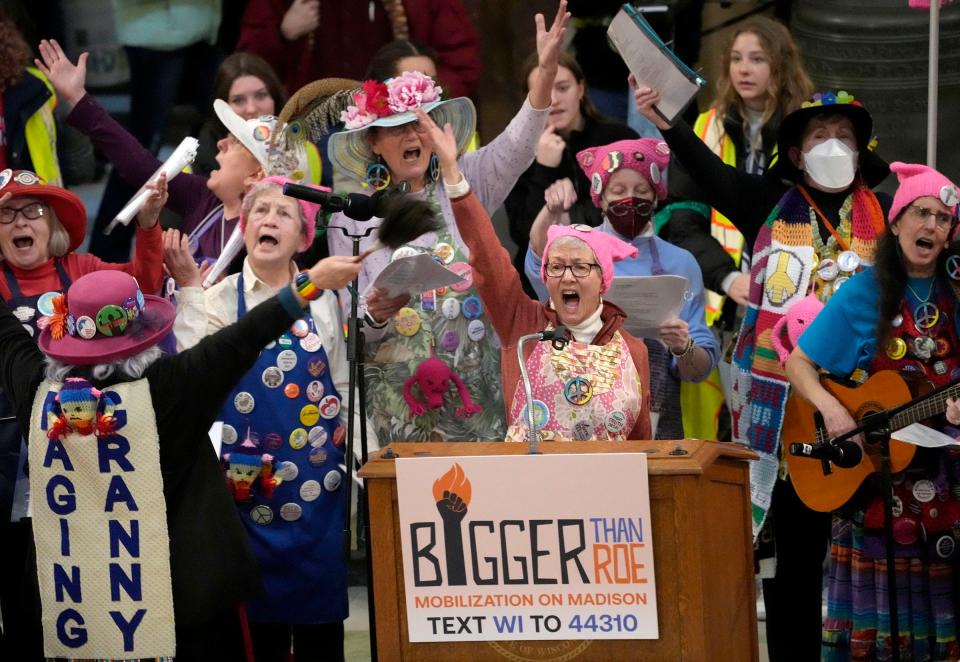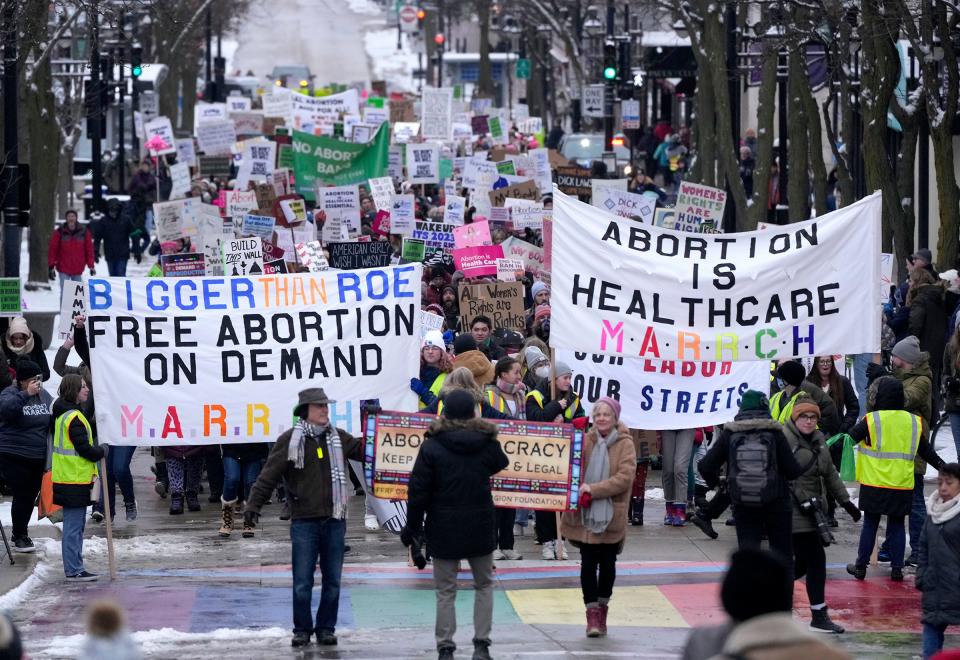Women’s march draws more than a thousand to Madison on 50th anniversary of Roe v. Wade
MADISON - More than a thousand protesters filled the state Capitol on Sunday to demonstrate their opposition to last year's landmark U.S. Supreme Court ruling that pushed abortion clinics across the state to close and made Wisconsin the epicenter of a national battle over abortion access.
Organizers of the National Women's March picked Wisconsin's capital city for the organization's annual rally to put the state's upcoming Supreme Court race under a political magnifying glass, underscoring the election's importance to the abortion debate in places like Wisconsin where doctors could face felony criminal charges for performing the procedure now that Roe v. Wade has been overturned.

"We will not be distracted by the drama in D.C. Instead we are sending a clear message to elected leaders and to our base — we are going to where the fight is, and that is at the state level," organizers of the protest wrote in their message to attendees about why they chose to march on Madison on the 50th anniversary of the 1973 Roe v. Wade ruling.
Meanwhile, thousands of people celebrating the U.S. Supreme Court ruling overturning Roe v. Wade convened in Washington on Friday for the annual March for Life − the group's first demonstration since the Dobbs v. Jackson Women's Health Organization ruling was released, marking a major victory for anti-abortion activists.
"I’m grateful that Roe was overturned, but very aware that the work to build a culture of life is not yet done," Jeanne Mancini, president of March for Life, told USA TODAY. "We are in a new season, where the people enjoy more freedom to enact laws to protect life, so our work to change hearts and minds is all the more important."
Abortions were legal in Wisconsin until about 20 weeks of pregnancy until the U.S. Supreme Court overturned Roe v. Wade last year, putting abortion policymaking back into statehouses. The ruling put back into place a state law drafted by Wisconsin lawmakers in the 19th century that criminalizes the procedure.
Whether the 1849 law is enforceable is being debated in court through a lawsuit to repeal the law brought by Democratic Gov. Tony Evers and Attorney General Josh Kaul. Republican lawmakers, abortion opponents and conservative legal experts say the law is now in effect. But nonpartisan attorneys for the state Legislature, Democratic lawmakers, and supporters of abortion access say potential and expected legal challenges muddy the answer to the question.
Practically, abortions have not been available in Wisconsin since the ruling given the legal uncertainty and the state ban in statute.

The Wisconsin Supreme Court election on April 4 will likely resolve the debate and set the state's abortion policy going forward, putting the race under national scrutiny as liberals and conservatives battle for control of the court that currently has a 4-3 conservative majority.
At stake is the state's abortion ban, the GOP-written legislative maps, and a number of conservative measures enacted by Republican lawmakers who have controlled the state Legislature for more than a decade, including former Gov. Scott Walker's signature legislation known as Act 10.
"Lives have already been saved in Wisconsin since the overturning of Roe, thanks to (the state abortion statute). We hope the law continues to be upheld and enforceable," Gracie Skogman, legislative director for anti-abortion advocacy group Wisconsin Right to Life, said.
“As pro-life advocates, we call for increased support for both women and their preborn babies, and hope we can find common ground with the women’s March in our advocacy for comprehensive healthcare, housing, and support for women.”
Supreme Court Justice Patience Roggensack, a conservative, is retiring. Four candidates are seeking to replace her: Waukesha County Judge Jennifer Dorow and former Supreme Court Justice Dan Kelly, both conservatives, and Dane County Judge Everett Mitchell and Milwaukee County Judge Janet Protasiewicz, both liberals.
Protesters participating Sunday's demonstration first gathered on the campus of University of Wisconsin-Madison, marched on Madison's most well-known thoroughfare of State Street, and concluded the event with a two-hour rally in the rotunda of the state Capitol.

"My daughter and all the young women I know have had the right to privacy − the constitutional right to privacy − taken away from them," said Kay Wilson, 71, of Jefferson.
Wilson, who said she considers herself a Democrat, said the state's abortion ban is one of the issues that is top of mind for her when considering candidates in the state Supreme Court race.
"It's ridiculous that we're still using a law that was written in 1849," Wilson said.
With the issue of abortion in focus, the typically low-turnout spring election is expected this year to draw spending that could reach tens of millions, breaking state records.
In the last state Supreme Court race, which coincided with the 2020 presidential primary, outside spending reached a state record high of $5 million. This year, Protasiewicz's campaign alone has raised nearly $1 million so far, and a political action committee funded by GOP megadonor Richard Uihlein has committed to spending millions on behalf of Kelly.

Mitchell and Protasiewicz have both signaled they would side with Democrats in the lawsuit, with Mitchell saying he does not believe the state abortion ban to be settled law and Protasiewicz calling the U.S. Supreme Court ruling overturning Roe v. Wade an incorrect decision.
Dorow and Kelly have not offered their positions on the lawsuit, but Kelly has promoted endorsements by anti-abortion advocacy groups.
Fifty-five percent of Wisconsin voters oppose the U.S. Supreme Court decision striking down Roe v. Wade while 37% support it, according to recent polling by the Marquette University Law School. Eighty-four percent of Wisconsin voters, including 73% of Republicans, polled said they supported rape and incest exceptions to the state's abortion ban.
As Democratic state officials pursue new abortion policy in court, Republican lawmakers are mulling changes to the current law and rebuffing Democratic lawmakers' legislative efforts to poll Wisconsin voters on whether the abortion ban should be repealed by putting an advisory referendum on the spring ballot − a move aimed at boosting turnout and putting Republican lawmakers on record opposing the idea.
Assembly Speaker Robin Vos, R-Rochester, has said he wants to amend the state's abortion law to include exceptions for pregnancies involving rape and incest and said he is open to requiring women to file a police report in order to obtain an abortion in cases of sexual assault. Evers has pledged to block such legislation in order to keep alive his lawsuit to repeal the law altogether.
Evers has said he supports returning Wisconsin's abortion policy to the law in place before the 2022 Supreme Court ruling overturning Roe v. Wade, which allowed abortions up until 20 weeks of pregnancy.
Senate Majority Leader Devin LeMahieu, R-Oostburg, said he supports clarifying the law to address uncertainty on the part of doctors in situations involving complications like ectopic pregnancies, which can require abortion procedures to address before a woman's health is at risk.
Kathryn Ann Dielentheis, an assistant professor in the Department of Obstetrics and Gynecology at the Medical College of Wisconsin who practices at Froedtert Health, said since Roe v. Wade was overturned, she has observed some fear within the Wisconsin medical community treating pregnant women of not meeting the letter of law when making treatment decisions when patients experience complications like ectopic pregnancies.
"There is a lot more fear about saying, OK, I have to have a definitive diagnosis beyond the shadow of a doubt, so that I can protect myself from prosecution. And I do think that previously we would have been able to say look, I cannot tell you definitively that this is an ectopic, but this is not normal. Something about this is wrong. Let's just take care of this," she said in a December interview. "Now there's this waiting game."
But Vos has said he doesn't believe such scenarios are playing out in health care facilities − making it unlikely both houses could reach a consensus on legislative changes to the abortion law.
"That's a lie − that's not true," Vos told the Journal Sentinel in December, in response to Dielentheis' comments. "That's somebody making a political point, not an actual medical decision."
Christine Fernando of USA Today contributed to this report.
This article originally appeared on Milwaukee Journal Sentinel: Women’s march draws more than a thousand to Madison on 50th anniversary of Roe

